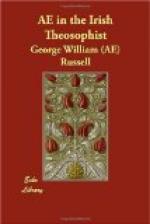—October 15, 1893
-------------- * Note—Kaliyuga. The fourth, the black or iron age, our present period, the duration of which is 432,000 years. It began 3,102 years B.C. at the moment of Krishna’s death, and the first cycle of 5,000 years will end between the years 1897 and 1898. --------------
The Meditation of Parvati
Parvata rose up from his seat under the banyan tree. He passed his hand unsteadily over his brow. Throughout the day the young ascetic had been plunged in profound meditation, and now, returning from heaven to earth, he was dazed like one who awakens in darkness and knows not where he is. All day long before his inner eye burned the light of the Lokas, until he was wearied and exhausted with their splendours; space glowed like a diamond with intolerable lustre, and there was no end to the dazzling processions of figures. He had seen the fiery dreams of the dead in Swargam. He had been tormented by the sweet singing of the Gandharvas, whose choral song reflected in its ripples the rhythmic pulse of Being. He saw how the orbs, which held them, were set within luminous orbs still of wider circuit, and vaster and vaster grew the vistas, and smaller seemed the soul at gaze, until at last, a mere speck of life, he bore the burden of innumerable worlds. Seeking for Brahma, he found only the great illusion as infinite as Brahma’s being.
If these things were shadows, the earth and the forests he returned to, viewed at evening, seemed still more unreal, the mere dusky flutter of a moth’s wings in space. Filmy and evanescent, if he had sunk down as through a transparency into the void, it would not have been wonderful. Parvati turned homeward, still half in trance: as he threaded the dim alleys he noticed not the flaming eyes that regarded him from the gloom; the serpents rustling amid the undergrowths; the lizards, fire-flies, insects, the innumerable lives of which the Indian forest was rumourous; they also were but shadows. He paused half unconsciously at the village, hearing the sound of human voices, of children at play. He felt a throb of pity for these tiny being who struggled and shouted, rolling over each other in ecstasies of joy; the great illusion had indeed devoured them before whom the Devas once were worshipers. Then close beside him he heard a voice; its low tones, its reverence soothed him: there was something akin to his own nature in it; it awakened him fully. A little crowd of five or six people were listening silently to an old man who read from a palm-leaf manuscript. Parvati knew his order by the orange-coloured robes he wore; a Bhikshu of the new faith. What was his delusion?




